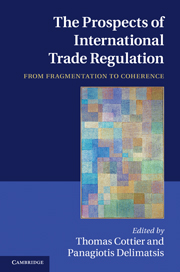Book contents
- Frontmatter
- Contents
- List of figures
- List of tables
- Contributors
- Preface and acknowledgements
- Table of cases
- List of abbreviations
- Introduction: fragmentation and coherence in international trade regulation: analysis and conceptual foundations
- PART I Constitutional issues in international trade regulation
- PART II Reforming specific areas of trade regulation
- PART III ‘Trade and…’ linkages
- 8 A call for a WTO ministerial decision on trade and human rights
- 9 The protection and promotion of cultural diversity in a digital networked environment: mapping possible advances towards coherence
- 10 Development and stability in the nexus between trade and finance
- 11 The regulatory framework of international investment: the challenge of fragmentation in a changing world economy
- 12 Low-income countries and commodity price volatility
- Index
- References
8 - A call for a WTO ministerial decision on trade and human rights
from PART III - ‘Trade and…’ linkages
Published online by Cambridge University Press: 26 April 2011
- Frontmatter
- Contents
- List of figures
- List of tables
- Contributors
- Preface and acknowledgements
- Table of cases
- List of abbreviations
- Introduction: fragmentation and coherence in international trade regulation: analysis and conceptual foundations
- PART I Constitutional issues in international trade regulation
- PART II Reforming specific areas of trade regulation
- PART III ‘Trade and…’ linkages
- 8 A call for a WTO ministerial decision on trade and human rights
- 9 The protection and promotion of cultural diversity in a digital networked environment: mapping possible advances towards coherence
- 10 Development and stability in the nexus between trade and finance
- 11 The regulatory framework of international investment: the challenge of fragmentation in a changing world economy
- 12 Low-income countries and commodity price volatility
- Index
- References
Summary
KEY MESSAGES
∙ International trade law and human rights share a common origin as mutually supportive bodies of law to protect individual freedom. Yet, to a large extent they developed in isolation from each other. As a result, the two regimes are now part of the fragmented landscape of international law. On the one hand, human rights protect individual rights that are essential for international trade, such as rights to freely pursue economic activities or freedom of expression. On the other hand, trade rules may jeopardise the realisation of human rights, especially social rights.
∙ In order to avoid negative impacts of this fragmentation, mechanisms for solving conflicts between the two regimes are necessary. We argue that such mechanisms require neither a rigid concept of hierarchy of norms nor new substantive obligations to be imposed on states. Instead, we call for appropriate procedures and coordination. This general procedural approach is illustrated for specific human rights and their relation to international trade law.
Introduction
At first glance, human rights and trade regimes do not have much in common. Human rights' primary focus on ensuring human dignity for each individual is absent from trade's commitment to ensuring that nations can flourish economically. Separate in their legal development in the twentieth century, human rights and trade regimes are, however, as offspring of an international post-world war order, both instruments of the same overall global interest, which is to promote peace and human welfare.
- Type
- Chapter
- Information
- The Prospects of International Trade RegulationFrom Fragmentation to Coherence, pp. 323 - 358Publisher: Cambridge University PressPrint publication year: 2011
References
- 3
- Cited by



